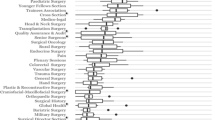Abstract
Background
We previously reported that professional forms of address in speaker introductions were inconsistently used at the Society of Surgical Oncology (SSO) 2018 and 2019 annual meetings, suggesting unconscious bias in speaker introductions. We sought to better understand how speakers would like to be introduced, and if guidelines could improve consistency in speaker introductions.
Methods
SSO 2021 abstract submitters received a survey regarding demographics and preferred form of address at the meeting. Respectful discourse guidelines were developed and distributed to meeting moderators. Speaker introductions were reviewed for the 2021 SSO annual meeting and were compared with the 2018 and 2019 meetings.
Results
The survey response rate was 183/347 (53%) abstract submitters, most of whom (143/183, 78%) indicated preference for a professional form of address (Doctor/Professor) during speaker introductions, which was significantly greater than those who were introduced with a professional form of address during the 2018 and 2019 meetings (351/499, 70%; Chi-square = 4.08, p = 0.043). There was no difference in speaker introduction preference based on gender or race/ethnic identification. Respectful discourse guidelines were developed and distributed to meeting moderators. During the 2021 SSO annual meeting, professional forms of address were used for 104 (84%) speakers, significantly greater than during the 2018 and 2019 meetings (Chi-square = 9.23, p = 0.002).
Conclusions
More survey respondents preferred speaker introductions with a professional form of address than were used in prior meetings. This preference was similar across all demographic groups evaluated. Professional addresses during speaker introductions increased significantly after the distribution of guidelines encouraging consistency to decrease unconscious bias and promote an inclusive environment.

Similar content being viewed by others
Change history
13 March 2022
A Correction to this paper has been published: https://doi.org/10.1245/s10434-022-11573-6
References
Torres MB, Salles A, Cochran A. Recognizing and reacting to microaggressions in medicine and surgery. JAMA Surg. 2019;154(9):868–72. https://doi.org/10.1001/jamasurg.2019.1648.
Duma N, Durani U, Woods CB, et al. Evaluating unconscious bias: speaker introductions at an international oncology conference. J Clin Oncol. 2019;37(36):3538–45. https://doi.org/10.1200/JCO.19.01608.
Stewart CL, De Andrade JP, Duma N, et al. Unconscious bias in speaker introductions at a surgical oncology meeting: hierarchy reigns over gender. Ann Surg Oncol. 2020;27(10):3754–61.
Davids JS, Lyu HG, Hoang CM, et al. Female representation and implicit gender bias at the 2017 American Society of Colon and Rectal Surgeons’ Annual Scientific and Tripartite Meeting. Dis Colon Rectum. 2019;62(3):357–62. https://doi.org/10.1097/DCR.0000000000001274.
Zeh HJ, Wong SL, Heslin MJ. Warm and welcoming: is it what we say or how we say it? Ann Surg Oncol. 2020;27(10):3581–2.
ExpertEd@SSO. 2019. https://experted.surgonc.org/Public/Catalog/Home.aspx?Criteria=110&tab=2. Accessed 1 Aug 2019.
Cavallo J. Using respectful language to reduce unconscious bias in oncology care. The ASCO Post. 10 Apr 2020.
West MA, Hwang S, Maier RV, et al. Ensuring equity, diversity, and inclusion in academic surgery: an American Surgical Association White Paper. Ann Surg. 2018;268(3):403–7.
The Royal College of Surgeons of England. Avoiding unconscious bias: a guide for surgeons. 2016.
Marcelin JR, Siraj DS, Victor R, Kotadia S, Maldonado YA. The impact of unconscious bias in healthcare: how to recognize and mitigate it. J Infect Dis. 2019;220(Suppl 2):S62–73. https://doi.org/10.1093/infdis/jiz214.
Capers QT, Clinchot D, McDougle L, Greenwald AG. Implicit racial bias in medical school admissions. Acad Med. 2017;92(3):365–9. https://doi.org/10.1097/acm.0000000000001388.
Gerull KM, Loe M, Seiler K, McAllister J, Salles A. Assessing gender bias in qualitative evaluations of surgical residents. Am J Surg. 2019;217(2):306–13. https://doi.org/10.1016/j.amjsurg.2018.09.029.
Qualifications of a Surgeon. 2021. https://www.rcseng.ac.uk/patient-care/surgical-staff-and-regulation/qualifications-of-a-surgeon/. Accessed 1 July 2021.
Setting Ground Rules—Civil Discourse and Difficult Decisions. United States Courts. https://www.uscourts.gov/educational-resources/educational-activities/setting-ground-rules-civil-discourse-and-difficult. Accessed 3 Mar 2020.
Lusk C, Delclos GL, Burau K, Drawhorn DD, Aday LA. Mail Versus internet surveys: determinants of method of response preferences among health professionals. Eval Health Prof. 2007;30(2):186–201. https://doi.org/10.1177/0163278707300634.
Martins Y, Lederman RI, Lowenstein CL, et al. Increasing response rates from physicians in oncology research: a structured literature review and data from a recent physician survey. Br J Cancer. 2012;106(6):1021–6. https://doi.org/10.1038/bjc.2012.28.
Acknowledgment
The authors would like to acknowledge the work of Rebecca Williams, Director of Scientific Meetings at the SSO, and Andrea King, Assistant Director of Governance and Administration, for their assistance with this work. The authors also would like to thank and acknowledge the leadership within the SSO, including the current president Dr. James Howe, for supporting this work.
Author information
Authors and Affiliations
Corresponding author
Ethics declarations
Disclosure
Martin Heslin undertakes electronic consultations for Best Doctors Inc. Camille L. Stewart, Susanne G. Warner, James De Andrade, and Andrew Nguyen have no disclosures to declare.
Additional information
Publisher's Note
Springer Nature remains neutral with regard to jurisdictional claims in published maps and institutional affiliations.
The original online version of this article was revised: The citations for references 7 through 13 were corrected both in the text and reference list.
Supplementary Information
Below is the link to the electronic supplementary material.
Rights and permissions
About this article
Cite this article
Stewart, C.L., Warner, S.G., De Andrade, J. et al. Data-Driven Respectful Discourse in the Society of Surgical Oncology. Ann Surg Oncol 29, 821–826 (2022). https://doi.org/10.1245/s10434-021-10808-2
Received:
Accepted:
Published:
Issue Date:
DOI: https://doi.org/10.1245/s10434-021-10808-2




